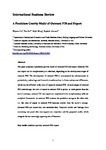A pendulum gravity model of outward FDI and export
| dc.contributor.author | Liu, Z | |
| dc.contributor.author | Xu, Y | |
| dc.contributor.author | Wang, Peijie | |
| dc.contributor.author | Akamavi, R | |
| dc.date.accessioned | 2016-08-05T13:11:36Z | |
| dc.date.accessioned | 2016-08-05T15:52:19Z | |
| dc.date.accessioned | 2016-08-05T16:00:45Z | |
| dc.date.available | 2016-08-05T13:11:36Z | |
| dc.date.available | 2016-08-05T15:52:19Z | |
| dc.date.issued | 2016-12-01 | |
| dc.identifier.issn | 0969-5931 | |
| dc.identifier.uri | http://hdl.handle.net/10026.1/5198 | |
| dc.description.abstract |
The paper proposes a pendulum gravity model of outward FDI and export. Outward FDI and export can be complementary or substitute, depending on the development stages of outward FDI. The development of outward FDI is accompanied by advancements in productivity, technology and favorable transformations in factor endowment differences, which can be reflected in the ratio of export to outward FDI. At early stages of outward FDI undertakings, the ratio of export to outward FDI is greater or much greater than the world's average, outward FDI and export are conjectured to be complementary with our analytical framework. As outward FDI matures, the pendulum swings to the other side, i.e., the ratio of export to outward FDI becomes smaller than the world's average. Outward FDI and export turn into substitute then. Empirical results and findings from examining two panel data sets support our conjecture and the proposed model, which integrate the two seemingly opposing sets of literature. | |
| dc.format.extent | 1356-1371 | |
| dc.language | en | |
| dc.language.iso | en | |
| dc.publisher | Elsevier BV | |
| dc.relation.replaces | http://hdl.handle.net/10026.1/5195 | |
| dc.relation.replaces | 10026.1/5195 | |
| dc.relation.replaces | http://hdl.handle.net/10026.1/5197 | |
| dc.relation.replaces | 10026.1/5197 | |
| dc.title | A pendulum gravity model of outward FDI and export | |
| dc.type | journal-article | |
| dc.type | Journal Article | |
| plymouth.issue | 6 | |
| plymouth.volume | 25 | |
| plymouth.publication-status | Published | |
| plymouth.journal | International Business Review | |
| dc.identifier.doi | 10.1016/j.ibusrev.2016.05.001 | |
| plymouth.organisational-group | /Plymouth | |
| plymouth.organisational-group | /Plymouth/Faculty of Arts, Humanities and Business | |
| plymouth.organisational-group | /Plymouth/Faculty of Arts, Humanities and Business/Plymouth Business School | |
| plymouth.organisational-group | /Plymouth/REF 2021 Researchers by UoA | |
| plymouth.organisational-group | /Plymouth/REF 2021 Researchers by UoA/UoA17 Business and Management Studies | |
| plymouth.organisational-group | /Plymouth/Users by role | |
| plymouth.organisational-group | /Plymouth/Users by role/Academics | |
| dcterms.dateAccepted | 2016-05-07 | |
| dc.rights.embargodate | 2017-11-28 | |
| dc.rights.embargoperiod | Not known | |
| rioxxterms.versionofrecord | 10.1016/j.ibusrev.2016.05.001 | |
| rioxxterms.licenseref.uri | http://www.rioxx.net/licenses/all-rights-reserved | |
| rioxxterms.licenseref.startdate | 2016-12-01 | |
| rioxxterms.type | Journal Article/Review |


